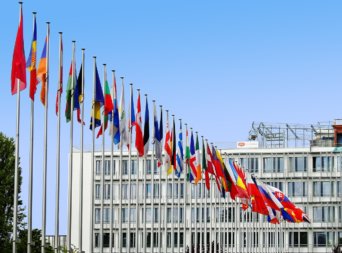- About
- Topics
- Picks
- Audio
- Story
- In-Depth
- Opinion
- News
- Donate
- Signup for our newsletterOur Editors' Best Picks.Send
Read, Debate: Engage.
| topic: | Democracy |
|---|---|
| located: | China, Russia, Turkey, Croatia, Montenegro, Serbia, Kosovo, Macedonia, The former Yugoslav Republic of, Albania, Bosnia and Herzegovina |
| editor: | Katarina Panić |
The enlargement policy, which applies to countries currently aspiring to become part of the European Union was initially considered as one of the most successful EU policies to date. But over the past several years, it has been facing severe challenges, such as Brexit or the rapid growth of influence of China, Russia and Turkey over the Western Balkans. Furthermore, there was the blocking of the accession negotiations in October 2019, called a "grave, historic error" by the then European Commission President Jean-Claude Juncker.
The EU-Western Balkans Summit, initially scheduled to kick off in Zagreb, instead took place via video conference last Wednesday, May 6. The 27 leaders of the EU member states decided to provide €3.3 billion for Albania, Bosnia and Herzegovina, Kosovo, Montenegro, North Macedonia, and Serbia to help the fight against the COVID-19.
"The fact that this support and cooperation goes far beyond what any other partner has provided to the region deserves public acknowledgement", the Zagreb declaration emphasised.
So, Bernd Riegert, the DW journalist, asked at the press conference that followed the Summit, should the Western Balkans be more grateful for the EU help and should the Serbian President Aleksandar Vučić kiss the European flag rather than the Chinese? Andrej Plenković, Prime Minister of Croatia said it was not up to him to talk on anyone's behalf, stressing that all six countries had clearly articulated their European orientation as their finalité politique.
"I think there is a lot of appreciation in all the capitals in the region for what the EU is doing. These countries are, in a way surrounded by the EU. If we look at geography, there is nowhere else they can go", Plenković answered.
Finally, the latest attack came from an unexpected place: the Western Balkans civil society, which is usually perceived as the most loyal ally of the EU.
"If the EU cannot guarantee and deliver on its own proclaimed values (within its borders), we […] must inevitably ask ourselves: with or without (E)U?", reads the declaration signed by 99 NGOs from 17 European countries which work in the fields of fundamental rights and the rule of law, democratic institutions, civic engagement, environmental protection, combating corruption and protection of migrants. If this is an attitude of pro-EU civil society organisations, as they claimed themselves, what would say the ones who oppose?
Image by Bruno /Germany

